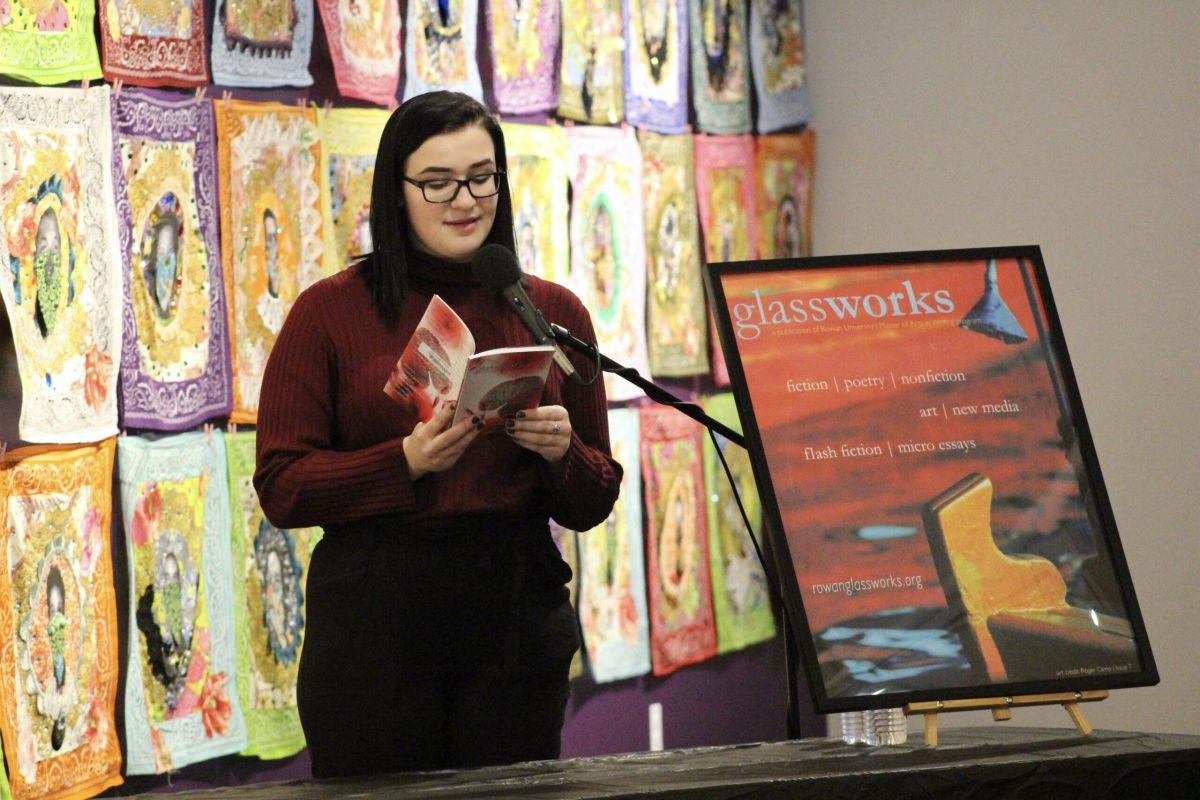Glassworks Magazine, Rowan University’s Master of Arts in Writing publication, held a launch reading for its newest issue in the Rowan Art Gallery on Thursday, March 7.
The reading for Issue 18 of the magazine featured guest speakers Jeffrey S. Markovitz and Joe Costal. Both writers have work featured in the current or past Glassworks issues.
Katherine Budris, editor-in-chief of Glassworks and a lecturer in the writing arts department, started the night by introducing associate editor Kaitlyn Gaffney, who read three poems from Issue 18.
Associate editor and writing arts senior Rachel Barton introduced Costal, a Rowan alumnus, high school administrator and college professor who read his short story from the new issue called “Puncher, America, and Fake-Ass Jordans.” The piece got laughs from the audience throughout, while commenting on gentrification in a place similar to his childhood home in West New York. He then read a poem he wrote the day of the reading, which he titled “Unit Price,” getting similar amounts of laughter.
“Oh my god, it’s amazing. I’m so happy to be back at Rowan,” he said after the reading. “Rowan’s so different from when I went here, but some things are exactly the same so it’s very cool and this was such a big and lively discussion.”
Associate editor and writing arts senior Laura Kincaid introduced Markovitz, a professor at the Community College of Philadelphia, who read the first chapter of his new novel “Permanent For Now.” His work was not in this issue, but has been in previous issues. His reading was much more serious than Costal, and the audience sat in an enthralled silence throughout.
After loud applause for both men, there was a question and answer session. Anthony Palma, the magazine’s managing editor, led the questions before opening it up to the audience, comprised of a little over 40 students, faculty members and editors filling the folding chairs. The speakers offered advice to writers and emphasized how identity shapes writing.
When freshman journalism major Nicholas Philhower asked how they write a character different from themselves, Markovitz said to “create empathy” and “tread lightly.”
Costal said to “be brave and don’t be afraid to vet it to people who will know.”
Budris, Palma, Gaffney, Barton and Kincaid are part of the many who worked on the magazine throughout the process.
“Primarily the magazine comes out of the Editing the Literary Journal class, which is a graduate course in the Master of Arts in Writing program,” Budris said. “The class runs every fall and the students learn what it takes to produce a literary magazine, so they read submissions. We get approximately somewhere between 1,500 and 2,000 submissions every year, and that’s just between August and December. Every submission gets read at least twice.”
While those students go through the “slush pile,” as Budris called it, they look for the strongest pieces and discuss them at the meeting before there is a final vote on what will be included in the issue. Along with reading submissions, Glassworks staff stay active on social media and the magazine’s website.
“We post things like book reviews, op-eds and interviews on the website, so the students learn about that in the class,” Budris said. “They produce all that editorial content for the website.”
Audio clips or reflections from writers are often featured, as well as flash fiction and editorial content monthly, all in the effort of producing quality work and promoting the magazine.
Budris’ favorite part of the process is showing students the world of literary magazines, one which may be difficult to discover on their own.
“Literary magazines are a great way to get to know new writers,” she said. “These are people who are sort of emerging in the field, who are working for small presses and maybe not on as grand a scale as someone like Stephen King.”
She also enjoys interacting with the authors.
“Things like this, getting to host local writers for reading and the question-and-answer session is always enjoyable. Students get to interact with writers who are publishing and active in the field, which is really exciting,” she said.
New issues of Glassworks can be purcahsed at readings for $10, and previous issues for $5. Glassworks literary content is available for free online at rowanglassworks.org, along with the editorial content. Copies can be purchased by contacting [email protected].
For questions/comments about this story, email [email protected] or tweet @TheWhitOnline.

























































































































































!["Working with [Dr. Lynch] is always a learning experience for me. She is a treasure,” said Thomas. - Staff Writer / Kacie Scibilia](https://thewhitonline.com/wp-content/uploads/2025/04/choir-1-1200x694.jpg)









































